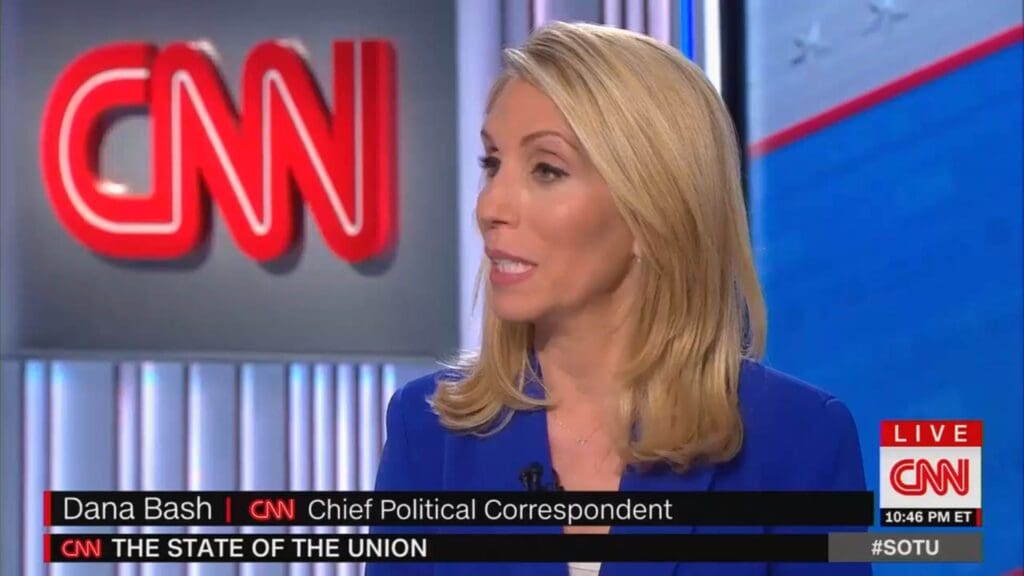CNN Reporter Reveals her ignorance of and bias against Poles in Poland’s post-Communist period

Chief Political Correspondent Dana Bash interviewed Polish President Duda on 6 April 2022 at the Presidential Palace in Warsaw to discuss the conflict in Ukraine. At 38:50 into the interview, Ms. Bash stated the following to President Duda:
In response to Ms. Bash’s accusatory statement, and as CNN did not provide the email address for Ms. Bash, PASI EDU President Gene Sokolowski submitted the following reply to CNN’s feedback center:
Dana Bash’s question to President Duda of Poland, “Do you think that the incredible generosity the Poles are showing right now to Ukrainian refugees is somehow a way to make up for those wrongs?”, regrettably confirms a profound ignorance of the facts, which explains her truly absurd and highly offensive question.
For Ms. Bash’s information, the “issue of antisemitism historically in Poland” cannot be addressed without understanding the issue of Jewish antipolonism historically in Poland. Most Polish Jews were antiassimilationist and viewed Poles through an Orthodox ethnoreligious lens and, like the Germans, they firmly believed Poles were inferior stock. Unlike their coreligionists in Germany, France, and Austria, few considered themselves Poles first and Jews second.
It may be of interest to Ms. Bash that since the 1100s, Jews in Poland enjoyed extensive autonomy and collective economic prosperity while developing sophisticated institutions of communal governance. Their cultural life included an infrastructure of religious and educational institutions as well as the cultivation of Ashkenazic and other traditions. Later generations regarded the precedents set by Polish Jewry in such areas as communal autonomy, education, and Jewish self-definition as classic models.
The rise of Jewish nationalism in the late 19th and early part of the 20th century fostered the expression of a distinctive ethnic and national identity, separate from that of the Poles, and thus exacerbated the situation. It was inevitable that the cultural and socioeconomic distinctions of Polish and Jewish society would translate into different political interests. The political agenda of the mainstream Jewish community during World War I and the early stages of Poland’s rebirth was a form of national autonomy. They wanted to live as a separate nation within a nation, among their own kind, with their own language, schools and institutions, and even their own government. Contacts with Poles would be kept to a minimum, mainly on the economic plane. However, in addition to exclusivist schools for the Jewish community which were to be funded by the state, Jews wanted to have it both ways; they also demanded full access to Polish schools as a vehicle for their own social advancement.
Now to Ms. Bash’s assertions of “wrongs”.
“…pogroms against Jews…” This is an accusatory generalization favored by Polonophobes and others who are ignorant of the facts. Pogroms were typically carried out by Russians during the period when Poland was partitioned by Russia, Prussia, and Austria. Pogroms during World War II were German-staged and during the Communist period were Soviet-staged.
“…concentration camps during World War II…” Ms. Bash’s profound ignorance is again on full display. All concentration camps in German-occupied Poland were established and operated by the Germans. Poles were interned and died in the camps well before Polish Jews, who were instead interned in German-established ghettos. Concentration camps initially designated for Poles included Auschwitz, Majdanek, Stutthof, Gross-Rosen, Neuengamme, Sachsenhausen, Dachau, and Mauthausen.
“…banishing Jews in 1968”. The 1968 crisis was a series of major student, intellectual, and other activist protests against the Communist regime. The crisis was foreshadowed in the previous summer when a group of Polish officials and Army officers had reacted to the Israeli victory in the 1967 June War by celebrating the triumph of ‘Our Jews’ [Israel’s Polish Jews] over ‘Their [Soviet-backed] Arabs’. This created a pro-Israel sympathy among the protesters who also maintained a visible anti-Soviet stance. Interior Minister Moczar used the dissident protests to initiate an anti-Zionist campaign, the purpose of which was to purge Polish Jewish rivals in the Communist party as well as left-leaning Polish Jews who were professionals, party officials, and secret police functionaries. As a result, about 13,000 Polish Jews were expelled.
In closing, Ms. Bash’s profoundly ignorant and highly offensive question to President Duda could have been prevented by researching the facts beforehand. She would have done well to adhere to the principles of journalism. Two such principles are pursuit of the truth and accuracy. Journalists can’t always guarantee truth but getting the facts right is the cardinal principle of journalism. Unfortunately, this was a professional responsibility that Ms. Bash failed to carry out.
Cordially,
Gene Sokolowski, President
Polish American Strategic Initiative Educational Organization (PASI EDU)
